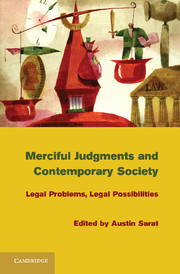Book contents
- Frontmatter
- Contents
- Acknowledgments
- Contributors
- When Can or Should Legal Judgment Be Merciful? An Introduction
- 1 The Place of Mercy in Legal Discourse
- Commentary on Chapter 1
- 2 Mercy, Crime Control, and Moral Credibility
- Commentary on Chapter 2
- 3 Defending a Role for Mercy in a Criminal Justice System
- Commentary on Chapter 3
- 4 Actions of Mercy
- Commentary on Chapter 4
- 5 A Feminist View of Mercy, Judgment, and the “Exception” in the Context of Transitional Justice
- Commentary on Chapter 5
- Index
- References
3 - Defending a Role for Mercy in a Criminal Justice System
Published online by Cambridge University Press: 05 December 2011
- Frontmatter
- Contents
- Acknowledgments
- Contributors
- When Can or Should Legal Judgment Be Merciful? An Introduction
- 1 The Place of Mercy in Legal Discourse
- Commentary on Chapter 1
- 2 Mercy, Crime Control, and Moral Credibility
- Commentary on Chapter 2
- 3 Defending a Role for Mercy in a Criminal Justice System
- Commentary on Chapter 3
- 4 Actions of Mercy
- Commentary on Chapter 4
- 5 A Feminist View of Mercy, Judgment, and the “Exception” in the Context of Transitional Justice
- Commentary on Chapter 5
- Index
- References
Summary
Introduction
Susan Atkins participated in several murders during 1969 as part of the notorious Manson family. Although originally sentenced to death, her punishment was soon commuted to life when California temporarily abolished the death penalty in 1972. By most accounts, she was a model prisoner who worked frequently to help fellow inmates. During her last parole hearing in 2009, she requested a compassionate release from further incarceration. She was suffering greatly from terminal brain cancer, recently had one leg amputated, was bedridden, had difficulty even speaking, and was paralyzed on one side of her body. The parole board denied her request, emphasizing the seriousness of her crimes and the lack of any excuses for them. She died less than a month later in a prison nursing facility.
Pan Am Flight 103 blew up over Lockerbie, Scotland, in December 1988. There were 270 fatalities. The catastrophe resulted from a bomb exploding in the luggage compartment of the plane. In 2001, Abdelbaset Ali Mohmed Al Megrahi, a Libyan, was convicted of being involved in planting the bomb. A Scottish court sentenced him to life. By August 2009, Megrahi was suffering from prostate cancer and given a short time to live. In that month, Scotland granted him a compassionate release to return home to Libya.
- Type
- Chapter
- Information
- Merciful Judgments and Contemporary SocietyLegal Problems, Legal Possibilities, pp. 138 - 194Publisher: Cambridge University PressPrint publication year: 2011
References
- 1
- Cited by



